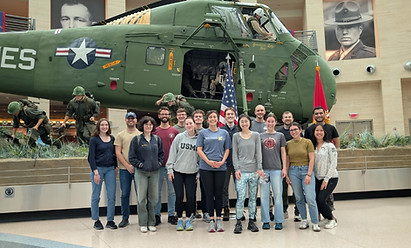Programs & Events

International and Domestic Staff Rides
The Merrill Center supports two domestic staff rides and one international staff ride per year for Johns Hopkins SAIS students. Staff rides are on-the-ground studies of military campaigns or larger conflicts. They are excellent opportunities for students not only to learn about a campaign or conflict in-depth, but also to build leadership, decision-making, and public speaking skills.

Quantico Leadership Venture
The Quantico Leadership Venture, coordinated by the Wharton School of the University of Pennsylvania, offers a small group of SAIS students a rare chance to experience firsthand the physical, mental, and emotional rigors of Officer Candidates School. Over the course of 24 hours, participants deepen their understanding of Marine Corps values, gaining clarity on how leadership is cultivated and tested within the military context.

NATO ACT Site Visit
For the past two years, a small group of SAIS students and faculty members have been able to travel to Norfolk, Virginia for a site visit to the NATO Allied Command Transformation (ACT) headquarters. Allied Command Transformation is one of two NATO strategic commands, tasked with leading the strategic warfare development of military structures, forces, capabilities, and doctrines.

Dining In
A Dining In is a formal dinner function, usually intended for members of a military organization or unit. It provides an occasion to celebrate the unique bond of a unit in an atmosphere of camaraderie, good fellowship, and fun. The Merrill Center's annual rendition of Dining In aims to bring this tradition to SAIS students and alumni, regardless of military background.

Speaker Series
The Merrill Center invites experts from academia, government, the military,
journalism, business, and non-governmental organizations to speak at
Johns Hopkins SAIS on a range of current and historical topics.

Alumni Relations
Through events such as the annual Strat Alumni Dinner, the Summer Soirée, and regular Happy Hours, the Merrill Center works in close partnership with the SAIS Strategic Studies Alumni Council to cultivate former students' relationship with the school's security studies-affiliated faculty, its current students with an interest in the field, and the wider national security community.
